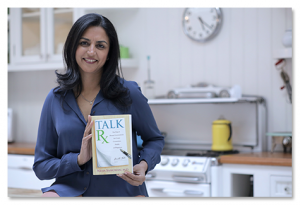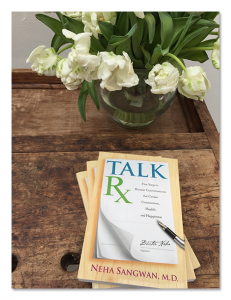How Honest Are Your Conversations? Apply the Awareness Prescription Starting Today
I’m delighted to introduce you to my friend and colleague Dr. Neha Sangwan. Years ago, Dr. Neha and I were both physicians, working side-by-side at a health maintenance organization—Dr. Neha in internal medicine while I worked in Women’s Health. Her new book, Talk Rx: Five Steps to Honest Conversations that Create Connection, Health, and Happiness is out next month. You can get a sneak preview of the book here.
Dr. Neha has a unique, fun, and practical way of making the connection between your health and your ability to communicate—at work, at home and with those you love. She shares personal examples from her own life as well as those from the many patients she’s seen over her years practicing as an internal medicine physician. These profound stories illustrate how everyday miscommunication is often at the root of our stress and our health issues. Honestly, I think miscommunication is a major player in adrenal problems. You’ve heard me talk about the importance of cortisol—so solving one of the underlying causes of stress in our everyday lives is a game changer. An
d the best part is, Dr. Neha doesn’t just talk about this in theory, she teaches you how to be a more effective communicator in your very next conversation!
Dr. Neha was raised by Indian immigrant parents who valued education. Her dad wanted her to be an engineer. Her mom wanted her to be a physician. As soon as she realized they weren’t mutually exclusive, she decided she would pursue both career paths. Had she chosen a traditional path, she would have become a physician partner and enjoyed security and stability for the rest of her career.
But at the HMO where we worked, Neha realized a lot more was going on beneath the surface. Her traditional medical training had equipped her to address the physical aspect of her patient’s acute health crisis, be it a stroke, a heart attack, pneumonia, or cancer. But she had yet to discover what would truly heal her patients—the art of medicine.
Each patient showed up in crisis. Each one had a story to tell. Knowing that Bruce Lipton’s research at Stanford as well as many other findings showed that more than 90% of illness is caused or exacerbated by stress, Dr. Neha began listening on a deeper level and became curious about what was truly ailing her patients. She began to notice a pattern and created what she now refers to as the Awareness Prescription.
The night before she discharged her patient, she would write five questions on a prescription pad for them to contemplate as they prepared to transition back into their daily routine.
The Awareness Prescription
Why this? (A stroke, heart attack or the particular ailment)?
Why now?
What might you have missed?
What else needs to be healed?
If you spoke from your heart, what would you say?
In the morning, patient after patient addressed these questions and were able to articulate the real reason they were sick. “The same issues resurfaced: Unresolved conflict. Unmet expectations. Misunderstandings. Broken promises. Unspoken truth. Heartbreak. Fractured relationships. Separation and Loss. Confusion. Depression. Unhappiness. Somewhere along the way, their communication with lovers, with friends, with co-workers, with family, with themselves—had broken down, and they were unable to bridge the gap. And it had almost killed them.”
Once they connected the dots between their physical health and their mental, emotional and social well-being, their lives were forever changed. They knew what conversations needed to happen and what relationships needed to be mended in order to continue their healing process after leaving the hospital.
As Dr. Neha further explored this new approach to healing, she studied communication and realized that, despite all of her schooling, there were some basic communication strategies and tools she had never been taught. This led her on a decade-long journey to become a master communicator.
“After more than 15 years of seeing patients and exploring the roots of physical illness. I’m convinced that communication is inextricably tied to our overall health. I’m not just talking about our emotional and social well-being; I’m talking about our physical health – the quality of our day-to-day lives, our energy, our stress and anxiety levels, the quality of our sleep, and even our ability to heal.”
How often do you say yes when you really mean no? Can you imagine how much less stress and frustration you’d have if you felt more confident in your everyday communication? What if you knew how to handle strong emotion—in yourself and in others? How profoundly would your life improve if you knew how to navigate conflict with ease?
Dr. Neha draws the connection between how the signals our body gives us help us understand how we’re handling (or not handling!) a given situation.
“One of the most delightful aspects of clear, effective communication are the unexpected twists that occur when you see connections that were previously invisible. These experiences change everything, and you’ll begin to connect to yourself and others differently. This book is about those magical moments – and the healing conversations that follow.”
TalkRx is chock full of everyday miscommunications that, once you become aware of them, will reduce your stress and save your time! One of my favorite chapters is when Dr. Neha describes how easy it is to get trapped in the Blame Game. She likens it to children playing a game of hot potato. It’s when people feel emotional or sensitive about a topic, they deflect it and instead make it about another person. This way, they avoid taking personal responsibility for their part in a situation—and this creates an endless loop of blame and distance.
“For many people, blame is a way of life. Choosing to let go of old thought patterns can be uncomfortable, and letting go of them, like letting go of anything, requires courage and self-trust to navigate what comes next. But once you step out of playing the blame game, you’ll have the mental space to expand your perspective and create new possibilities in your relationships.”
Once Dr. Neha shares a concept, she teaches us how to rewire our thinking about ourselves and how we relate to others. The practical tools she shares are so powerful, you’ll find yourself communicating differently in your very next interaction. With personal anecdotes, powerful patient encounters and practical tools, TalkRx will elevate your ability to communicate and gain a distinct advantage in every conversation.
Isn’t it time for a different kind of prescription? My hope is that you’ll enjoy TalkRx: Five Steps to Honest Conversations that Create Connection, Health and Happiness as much as I did. Get your copy here.

